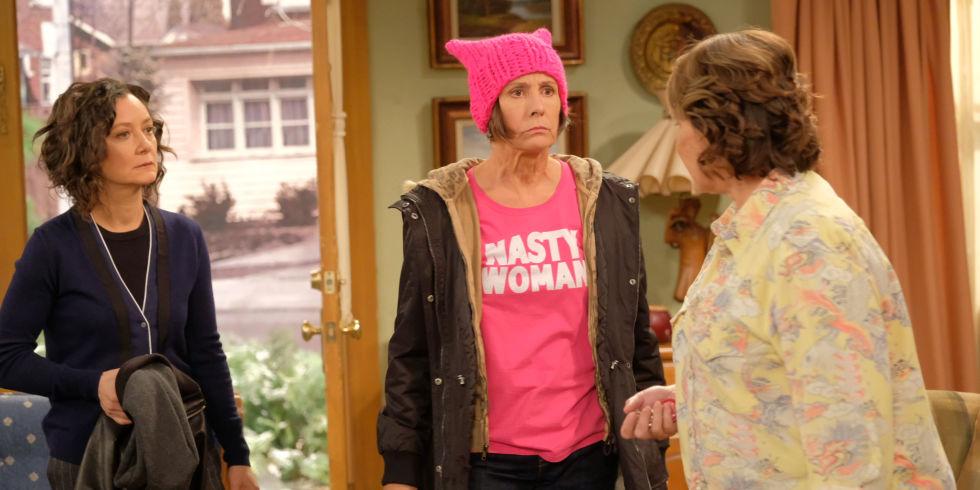Roseanne is back: But does 2018 actually need her?
The Connors return to a world of divisive politics

Your support helps us to tell the story
From reproductive rights to climate change to Big Tech, The Independent is on the ground when the story is developing. Whether it's investigating the financials of Elon Musk's pro-Trump PAC or producing our latest documentary, 'The A Word', which shines a light on the American women fighting for reproductive rights, we know how important it is to parse out the facts from the messaging.
At such a critical moment in US history, we need reporters on the ground. Your donation allows us to keep sending journalists to speak to both sides of the story.
The Independent is trusted by Americans across the entire political spectrum. And unlike many other quality news outlets, we choose not to lock Americans out of our reporting and analysis with paywalls. We believe quality journalism should be available to everyone, paid for by those who can afford it.
Your support makes all the difference.After the series finale of Roseanne in 1997, you probably never thought you’d end up back in Langford. But alas, the resurgence of America’s most popular TV shows is in full swing. Joining the ranks of Will & Grace and Full House, Roseanne Barr’s family sitcom aptly titled Roseanne has been revived after 21 years off the air. Like many of the recent reboots, Roseanne did have a definitive ending.
For those who watched the original hit series, Roseanne Connor’s husband Dan (John Goodman) was presumably dead by the end of the series. However in the reboot, the show pokes fun at the original ending with Roseanne waking Dan while he’s in a sleep apnea mask. "I thought you were dead," she says to Dan. He replies, "Why does everybody always think I’m dead?"
But with a time jump, anything is possible, so Roseanne is back with all of the original cast members. A show that was originally about the deeply interpersonal dynamics of a family has evolved into political debates. It makes sense: we’re in a tumultuous political climate. But the Connors shifting their focus to politics and social issues as a main plot point seems contrived when reminiscing about the original characters on the series.
It’s clear that its premise is to show the relationship between family members who don’t agree on politics and social issues and how they fight, reconcile and find middle ground. But it’s unclear if it will be executed in a way that goes beyond the surface.
The first episode of the new Roseanne centres around a sisterly political feud between the titular character and her sister Jackie (Laurie Metcalf). Roseanne - like the actress in real life - voted for Donald Trump while Jackie did not. Instead she shows up clad in a “Nasty Woman” shirt and pussy hat at odds with her sister since Trump took office. It turns out Jackie didn’t vote for Hillary Clinton - she voted for Jill Stein - but the family rivalries amidst the political war zone in the US is realistic.
In the revival, however, the show does incorporate a variety of intriguing storylines: Roseanne’s son D.J (Michael Fishman), is father to a black daughter while his wife is serving in the military overseas; Darlene (Sara Gilbert) lost her job, so she had to move home with her parents along with her two kids; Becky (Lecy Goranson) is looking to become a surrogate to save money and reduce her debt. The new show even tackles gender fluidity - thanks to Darlene’s non-binary child Mark - and plans to confront racism, which the show didn’t do much of when it started. Now significantly older, Roseanne and Dan have multiple health issues and lack the healthcare they need to help them.
Eventually Roseanne and Jackie finally reconcile (thanks to Jackie’s Jill Stein reveal), but the sisters share their unapologetically concede for the way they acted. “I guess I didn’t mean to imply that you’re some right-wing jackass,” Jackie said. “I should have tried to understand why you voted the crazy way that you did.” Roseanne’s reply didn’t help progress their political conversation either: “And I should have understood that you want the government to give everyone free healthcare because you’re a good-hearted person who can’t do simple math.” While their disagreement might have ended, there was no real resolution for the political divide that
While the first two episodes may not be what people expected in terms of Trump propaganda, it is only the beginning of the series. It will take more than two 30-minute episodes to fully understand whether or not a Roseanne revival was necessary in the Trump era or at all.
Join our commenting forum
Join thought-provoking conversations, follow other Independent readers and see their replies
Comments